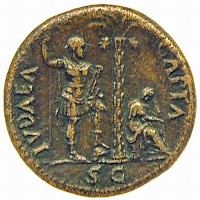Fiscus Judaicus
Fiscus Judaicus ("Jewish tax"): a tax that the Jews had to pay to the temple of the Roman supreme god Jupiter Capitolinus after the destruction of their own temple in 70 CE.

In 70, the Roman general Titus captured the holy city of Judaism, Jerusalem. The temple was destroyed by fire and many Jews were taken captive; some of them had to build a canal in Seleucia, others were deported to Italy and forced to build the Colosseum in Rome. The fabulous treasure of the temple was also transported to the capital of the Roman Empire, where it was used to solve the financial problems that had been caused by the fire of Rome (64), mismanagement by the emperor Nero, and the civil war of the year 69. The new emperor, Titus' father Vespasian, badly needed all money he could get, including the temple treasure of Jerusalem.
One of his financial measures was the creation of tax that had to be paid by those Jews who were still free: the fiscus Judaicus.note In fact, this was not a completely novel tax: every Jewish man between 20 and 50 had paid a sum of two drachms (or eight sesterces) to the temple.note Now, this tax flow was redirected to Rome,note where it was spent on the reconstruction of the temple of Jupiter Optimus Maximus at the Capitol, which had been destroyed during the civil war.
For the Jews, it must have been a psychological humiliation to pay to a deity they believed not to exist, especially because the fiscus Judaicus was continued after the Capitoline temple had been restored. The reason for this continuation was that the measure was not only meant as improvement of Rome's finances, but also to deter people from converting to Judaism (proselytizing).
Vespasian's son Domitian (emperor 81-96) went to extremes to receive the money. The Roman author Suetonius records that he once saw how an old man's penis was controlled by tax gatherers to see whether it had been circumcised. In Edfu in Egypt, seventy-one receipts have been found, from which we learn that even boys and girls were forced to pay the two drachms. As there were about five million Jews in the Roman empire, the fiscus Judaicus offered the government some 40 million sesterces, enough to pay for three legions
The emperor Nerva (96-98) softened the measure,note but the fiscus Judaicus was still in existence for a long time. An important side-effect of Nerva's changes was the introduction of a definition of Jewishness as the permitted form of monotheism: those paying the fiscus Judaicus would not be forced to sacrifice to the emperor. There was, from now on, also an unlicensed forms of monotheism: Christianity. Its members did not have to pay the two drachms, but could be persecuted.
Literature
- Marius Heemstra, The Fiscus Judaicus and the parting of the Ways (2010 Tübingen)